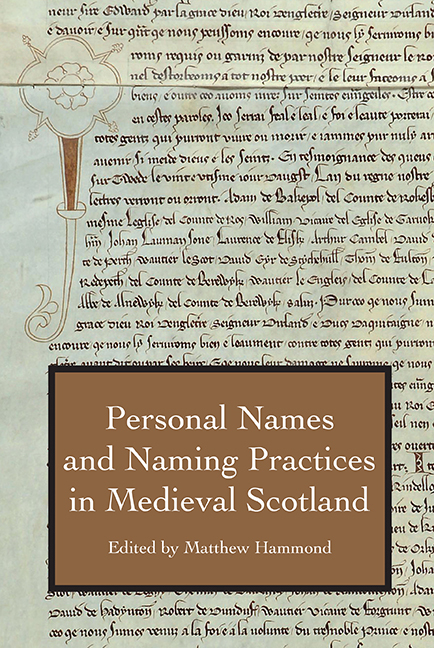Book contents
- Frontmatter
- Dedication
- Contents
- List of Tables
- Acknowledgements
- List of Contributors
- Abbreviations
- Note on the Text
- 1 Introduction: The Study of Personal Names in Medieval Scotland
- 2 Personal Names in Early Medieval Gaelic Chronicles
- 3 Gaelic Personal Names and Name Elements in Scottish Charters, 1093–1286
- 4 The Development of Mac Surnames in the Gaelic World
- 5 Forflissa/Forbflaith/Hvarflöð
- 6 Masculine Given Names of Germanic Origin in the Ragman Roll (1296)
- 7 The Romance of Names: Literary Personal Names in Twelfth- and Thirteenth-Century Scotland
- 8 Old Testament Personal Names in Scotland Before The Wars of Independence
- 9 Duthac Wigmore and Ninian Wallace: Scottish Saints and Personal Names in the later Middle Ages
- 10 Saints in Names in Late Medieval Argyll: a Preliminary Enquiry
- Bibliography
- Index
- Studies in Celtic History
4 - The Development of Mac Surnames in the Gaelic World
Published online by Cambridge University Press: 18 September 2019
- Frontmatter
- Dedication
- Contents
- List of Tables
- Acknowledgements
- List of Contributors
- Abbreviations
- Note on the Text
- 1 Introduction: The Study of Personal Names in Medieval Scotland
- 2 Personal Names in Early Medieval Gaelic Chronicles
- 3 Gaelic Personal Names and Name Elements in Scottish Charters, 1093–1286
- 4 The Development of Mac Surnames in the Gaelic World
- 5 Forflissa/Forbflaith/Hvarflöð
- 6 Masculine Given Names of Germanic Origin in the Ragman Roll (1296)
- 7 The Romance of Names: Literary Personal Names in Twelfth- and Thirteenth-Century Scotland
- 8 Old Testament Personal Names in Scotland Before The Wars of Independence
- 9 Duthac Wigmore and Ninian Wallace: Scottish Saints and Personal Names in the later Middle Ages
- 10 Saints in Names in Late Medieval Argyll: a Preliminary Enquiry
- Bibliography
- Index
- Studies in Celtic History
Summary
In a 1993 paper, the late great scholar of Scotland's Gaelic past, John Bannerman, made a remarkable claim about the origins of the ruling dynasty of Scotland's premier medieval earldom, Fife. The kindred, known as Clan MacDuff by the late fourteenth century, were descended from the short-reigning King Dub (962–6), he argued, thus explaining the earls’ favoured status in the twelfth century and later (they had an important role in the royal inauguration ceremony, for example). This descent has been broadly accepted by historians, but the fact that it rests on a distinctive interpretation of the development of surnames using the word mac (son) has rarely been the subject of comment. Bannerman's argument hinged on the adoption of the ‘style’, whereby the bearer uses what had previously been a patronymic as a kind of title declaring his position as head of kindred, by the middle of the eleventh century. He contended that MacDuff (or MacDuib) of later King Macbeth legend, whom he accepted as a genuine historical figure, was the first to use the surname form MacDuff as a style. The crucial evidence was one ‘Constantinus filius Magdufe’, witness to the 1095 Durham charter of Edgar, king of Scots: Constantine's father must have been using MacDuff as a style, he argued. By ca 1128, when ‘Gillemichel mac duf’ was present for the dedication of the abbey church of Dunfermline, the style had developed into a surname, Bannerman thought. Bannerman found corroboration for his points on surname development in the Irish annals. The Irish analogues for the appearance of the mac name as a surname borne by a grandson of the eponym among families of a similar social standing to whom Bannerman pointed were 1162 (Mac Murchada kings of Leinster), 1167 (Mac Lachlainn kings of Ailech/Cenél nEógain), and 1200 (Mac Cárthaig kings of South Munster/Desmumu/Desmond). This would mean that mac surnames had developed at least thirty years earlier in Scotland than in Ireland. Is it really likely that the distinctive mac surname form developed in eastern Scotland before Ireland? In this chapter, I will first examine the Irish evidence in greater detail, then use the People of Medieval Scotland database to survey the charter evidence of the twelfth and thirteenth centuries to try to illuminate how, when, and why mac surnames emerged in the Gaelic world.
- Type
- Chapter
- Information
- Publisher: Boydell & BrewerPrint publication year: 2019

